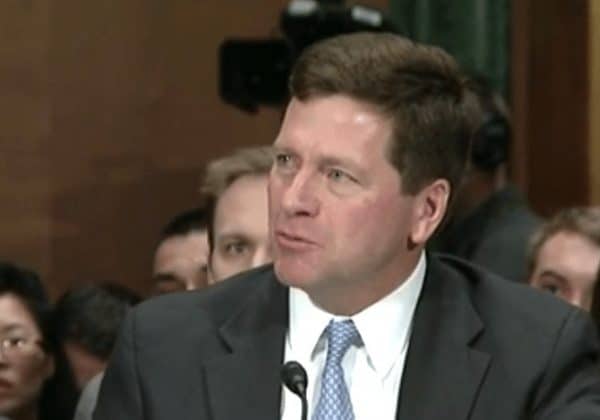Today marked a major turning point for the private capital markets in America. While most of the country is squarely focused on the election, the SEC quietly passed dramatic improvements to securities laws for startups, small businesses and investors everywhere.
The SEC’s actions today signified, without a doubt, the most significant changes to securities laws since the passage of the JOBS Act back in 2012. Instead of focusing on the specific changes (which you can find here), I wanted to instead share why the SEC’s actions inspired renewed confidence in me that, with a little patience, it’s still possible to work with the government to enact real change.
Nine years ago while completing my second year at business school, I indirectly entered the world of politics and securities law. At the time I was a wide-eyed entrepreneur who saw an opportunity to move startup capital raising and investing online for the first time. We were able to help get historic changes to securities laws passed in April 2012 and the respective bill claimed that the JOBS Act would be fully implemented by December 2012. Although many older, wiser people cautioned me that the SEC would take much longer than by December 2012, I didn’t listen and embarked on launching a business to leverage these historic changes.
I learned a hard lesson over the ensuing years. I learned that the SEC is an independent entity and ultimately wields the power to neuter a bill or even just ignore it for years if they don’t like it. Unfortunately for the JOBS Act, during 2012 and the first half of 2013, a few top officials at the SEC were not fans of the proposed changes and took their time with their rulemaking process. Then in April 2013, Mary Jo White was sworn in as Chair of the SEC, and during her first month in office, we were invited to meet with her to demo SeedInvest and discuss the JOBS Act. Over the next couple of years, Chair White admirably spearheaded the implementation of the JOBS Act, although it ultimately took three and a half years longer than originally expected.
As we mentioned to lawmakers on Capitol Hill, to SEC staff, and to various Commissioners over the years, the laws that were passed were far from perfect. We’ve written numerous comment letters, visited D.C. dozens of times, and have presented at the SEC on this topic.
While it seemed somewhat magical to be able to help get the JOBS Act signed into law in 2012 and to get a number of our suggestions implemented in the final rules in 2015 and 2016, the last four years of lobbying were somewhat sobering at best.
It seemed like no matter how many times we had encouraging meetings with regulators or lawmakers, no matter how much data we produced that supported the fact that the JOBS Act was working, nothing seemed to actually move forward:
- In 2016, we presented at the SEC Government-Business Forum on Small Business Capital Formation, and let them know that there were a large number of entrepreneurs who were unserved by the private capital markets given the $1 million cap on Reg CF, the ineffectiveness of Reg A+, Tier I and the requirements of Reg A+, Tier II.
- In 2018, we co-authored a letter to Chairman Jay Clayton requesting the SEC to raise the Regulation Crowdfunding cap and followed that up with a petition that was supported by over 2,500 entrepreneurs from across the country.
- Earlier this year, we submitted a comment letter to the SEC, commending the Commission for taking a proactive approach to modernizing and improving U.S. securities exemptions and urging it to raise the Reg CF cap to $5 million and to permit “testing the waters” under Reg CF.
Despite additional conversations with Commissioners and SEC Staff, it seemed that all of these efforts would ultimately fall short ahead of the upcoming election and that we would potentially have to go back to the drawing board in 2021.
But then something miraculous happened this morning – all of Chairman Clayton’s public statements about leveling the playing field for everyday investors and fixing the legacy patchwork of securities laws actually came to fruition. Chairman Clayton came into office with a vision of reimagining securities laws and despite being met with resistance from the usual suspects, he followed through. And I am confident he will leave a lasting legacy for entrepreneurs and investors in the U.S.
The changes that the SEC implemented today were a major step forward for entrepreneurship in America. Although there is no shortage of capital available to so-called unicorns (late-stage, billion-dollar companies), the same is not true for early-stage startups.
As a result, fundraising is the absolute worst part of starting a company and is the reason most entrepreneurs throw in the towel before they gain traction. Since the passage of the JOBS Act, the idea of online fundraising has been an intriguing one for many entrepreneurs, but the cost and complexity have historically forced many founders to stick with traditional capital raising or just give up altogether. By facilitating better access to capital, the SEC will create thousands of life-changing technologies and millions of jobs over the coming years.
 On the investor side, thanks to the JOBS Act, Main Street investors gained access to startup investments, but historically they have only been able to invest in just a small fraction of investment opportunities, and not necessarily the best ones. The JOBS Act took a public company regulation framework and forced it on early-stage startups and small businesses. This in turn added too much friction and cost into novel regulatory exemptions such as Regulation Crowdfunding, which forced many of the best companies to stick with traditional fundraising, which has continued to circumvent non-accredited investors.
On the investor side, thanks to the JOBS Act, Main Street investors gained access to startup investments, but historically they have only been able to invest in just a small fraction of investment opportunities, and not necessarily the best ones. The JOBS Act took a public company regulation framework and forced it on early-stage startups and small businesses. This in turn added too much friction and cost into novel regulatory exemptions such as Regulation Crowdfunding, which forced many of the best companies to stick with traditional fundraising, which has continued to circumvent non-accredited investors.
The most vocal opponents to today’s changes cited concerns about investor protections but ironically, by including too many disclosure requirements in the original JOBS Act, certain components of the bill actually did not increase Main Street investor protections, it reduced them. That’s because the best investor protection for Main Street investors is access to the best investment opportunities. The changes implemented today will make online fundraising much more attractive to the very best startups which will undoubtedly result in better investment opportunities for retail investors and ultimately help to level the playing field.
The SEC’s proactiveness and decisive action today has inspired me and instilled in me renewed confidence in the agency. I am once again confident that, although results take time, the SEC does in fact listen carefully to feedback and recommendations.
I am also encouraged that, although we have become increasingly polarized as a nation, government agencies can still get things done and work to improve the status quo. In closing, I’d like to thank Chairman Clayton for his persistence, the SEC Staff for their creativity and hard work, and a special thanks to the following people at the SEC for taking the time to listen over the last few years:
- Commissioner Hester Peirce
- Sebastian Gomez, Deputy Director of the Small Business Advocacy Office
- Martha Miller, Director of the Office of the Advocate for Small Business Capital Formation
- Jennifer Zepralka, Chief of the Office of Small Business Policy
 Ryan Feit is the CEO and Co-Founder of SeedInvest. Prior to founding SeedInvest, Ryan worked at Wellspring Capital Management and Lehman Brothers in New York City where he invested in, financed, and managed dozens of private and public businesses. Ryan was instrumental in the passage of the 2012 JOBS Act which changed 80-year-old U.S. securities laws to make it possible for entrepreneurs to raise capital over the Internet. Since 2012, he has worked closely with members of the SEC, FINRA, the White House, and the Treasury Department on the implementation of the JOBS Act. Ryan currently serves on FINRA’s Fintech Committee and previously served as a board member of the Crowdfund Intermediary Regulatory Advocates and the Crowdfunding Professional Association. He is a founding member of the Association of Online Investment Platforms. In addition, he frequently serves as a subject matter expert on startup investing and the JOBS Act for the Wall Street Journal, the Washington Post, CNBC, FoxBusiness, the Economist, and the New York Times as well as a columnist for Fortune Magazine and Inc. Magazine.
Ryan Feit is the CEO and Co-Founder of SeedInvest. Prior to founding SeedInvest, Ryan worked at Wellspring Capital Management and Lehman Brothers in New York City where he invested in, financed, and managed dozens of private and public businesses. Ryan was instrumental in the passage of the 2012 JOBS Act which changed 80-year-old U.S. securities laws to make it possible for entrepreneurs to raise capital over the Internet. Since 2012, he has worked closely with members of the SEC, FINRA, the White House, and the Treasury Department on the implementation of the JOBS Act. Ryan currently serves on FINRA’s Fintech Committee and previously served as a board member of the Crowdfund Intermediary Regulatory Advocates and the Crowdfunding Professional Association. He is a founding member of the Association of Online Investment Platforms. In addition, he frequently serves as a subject matter expert on startup investing and the JOBS Act for the Wall Street Journal, the Washington Post, CNBC, FoxBusiness, the Economist, and the New York Times as well as a columnist for Fortune Magazine and Inc. Magazine.



